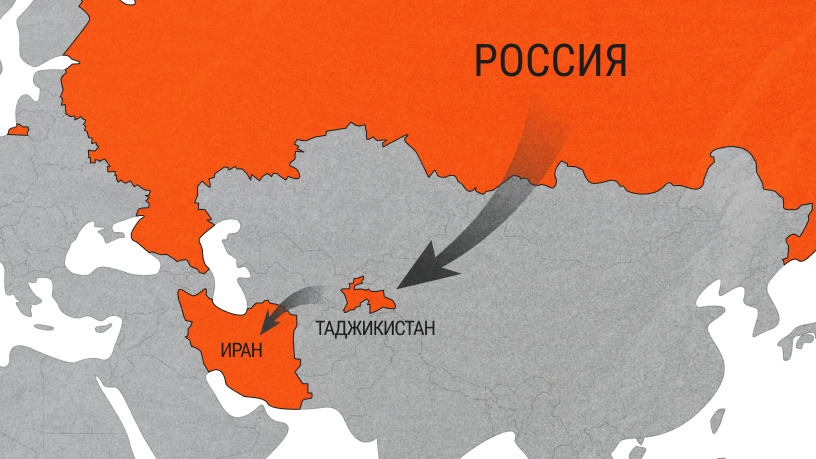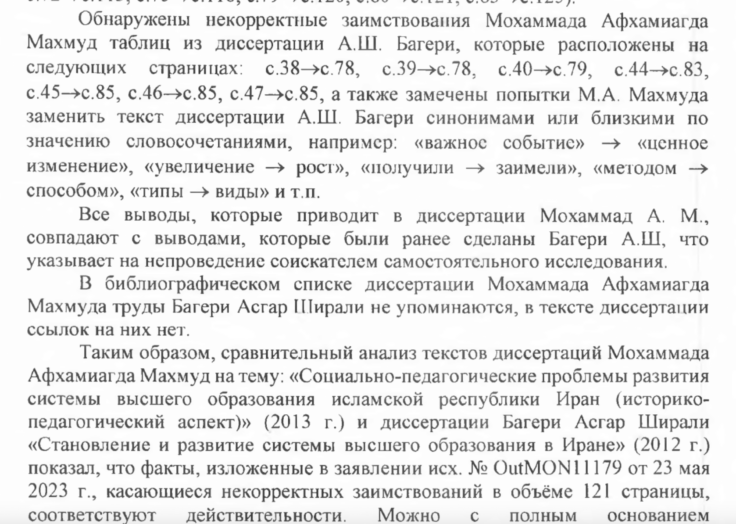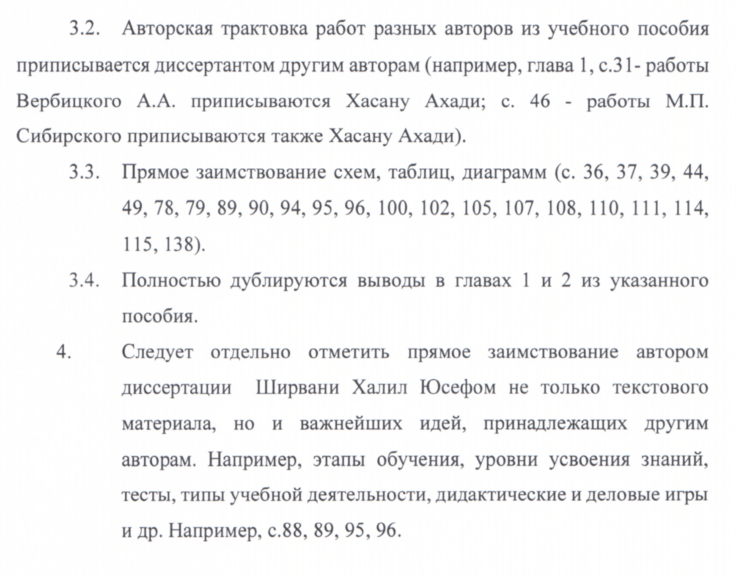
T-invariant, co-founder of Dissernet Andrey Rostovtsev and community project coordinator Larisa Melikhova continue their “Plagiarism Navigator”. Through individual cases of international academic plagiarism, we examine the global-scale imitation of scholarly activity. To tackle this issue, specially trained NLP language models—developed in collaboration with linguists from the universities of Helsinki and Oslo—are employed. In this second installment, we focus on Iranian scholars who defended their dissertations in Tajikistan between 2011 and 2013 under the auspices of the Russian Higher Attestation Commission (VAK).
Previously in Plagiarism Navigator
Episode 1: China-Ukraine-Poland – The story of a Chinese scholar who defended a dissertation in Kharkiv, cobbled together from Russian-language works translated into Ukrainian.
After the collapse of the Soviet Union, Tajikistan opted not to establish its own academic degree system and remained under the jurisdiction of Russia’s Higher Attestation Commission (VAK). This decision hardly benefited Tajik academia. The Soviet-era practice of trading Russian-language dissertations gained new momentum with technological advancements, including easier access to vast repositories of Russian texts. Meanwhile, VAK’s oversight appears to have become a mere formality for applicants from Tajikistan.
Dissernet has published around 150 plagiarized dissertations defended in Tajik dissertation councils and rubber-stamped by the Russian VAK. Surprisingly, Tajik President Emomali Rahmon recently acknowledged this fact, praising Dissernet’s work while lamenting the decline in Tajik academia’s reputation due to “some candidates not writing their own theses—or even understanding them.” However, the president underestimated the number of Tajik scholars officially stripped of their degrees by the Russian Ministry of Education and Science: he cited seven cases, while Dissernet’s current tally stands at 46, with several more revocation requests (ZoLUS) pending. Regardless, this has done little to stem the tide of fraudulent dissertations.
An intriguing phenomenon has emerged: enterprising careerists from neighboring countries have exploited the fact that a VAK-approved degree is recognized in 140 countries, flocking to Tajikistan to defend their theses. Of the 150 bogus dissertations linked to Tajik dissertation councils on Dissernet, a significant portion belong to “dissertation tourists,” particularly from Iran.
Typically, such schemes involve an international division of labor: a university establishes a conveyor belt for “tourists” from a specific country. For Iran, that institution became the Tajik State Pedagogical University named after Sadriddin Ayni (TSPU). While TSPU ranks only third in Dissernet’s anti-ranking of Tajik universities by fraudulent defenses (behind the Tajik National University and the Tajik State University of Commerce), at least nine of its faculty members are implicated in Dissernet’s investigations. Moreover, at least 21 plagiarized dissertations were defended there.
A distinctive feature of these Iranian dissertations is their authors’ lack of effort in blending borrowed sources. Most are wholesale copies of a single Russian-language text, suggesting that the ghostwriters didn’t even bother compiling multiple sources—likely because the clients had poor command of Russian. This theory is further supported by the fact that defending a Russian-language dissertation appears to have been a one-off service for these scholars: we found no subsequent publications where they cited Russian sources (or improperly copied translated Russian texts).
English-language information is also scarce—unsurprising, given Iran’s earlier embrace of “sovereign democracy” and traditional values. Without knowledge of Farsi, we couldn’t determine what positions these individuals hold today.
By contrast, information on Tajikistan is far more accessible in Russian. In nearly all the dissertations below, the advisors and opponents are Dissernet subjects—either with plagiarized theses of their own or as participants in fraudulent defenses.
Today, we present five Iranian scholars who defended dissertations in Tajikistan (2011–2013) under VAK’s authority—and were later stripped of their degrees by the same body.
Sharifi Alirizo
His dissertation, “Pedagogical Foundations of Lesson Planning and Curriculum in Iran’s Education System”, was 90% plagiarized from another Iranian’s thesis defended a year earlier in the same council, with the same advisor and opponents.
His Supervisor – Samardin Avganov – a professor at Tajik State Pedagogical University (TSPU) – had himself “stitched together” his doctoral thesis from three Russian dissertations. Furthermore, he participated in at least six sham defenses as either advisor or opponent.
A full decade after the defense (just before the statute of limitations expired), Dissernet filed a petition to revoke the degree (ZoLUS). The complaint was forwarded by VAK to Pyatigorsk State University – an institution not particularly known for academic integrity. Nevertheless, the dissertation council unanimously voted to strip the degree, a decision later upheld by VAK, resulting in Alirizo’s formal revocation in December 2024.
Based on the scant English-language information available, it appears the professor remains unaware that his “service” has been rescinded – he continues using his academic title to this day.
Afhamiagda Mahmud Mohammad
His 2013 dissertation, “Socio-Pedagogical Issues in Iran’s Higher Education: A Historical-Pedagogical Perspective”, was 90% copied from another Iranian thesis in Russian.
Thesis advisor Mansur Nugmonov, a professor at Tajik State Pedagogical University (TSPU), has been implicated in five fraudulent defense cases. Of these:
– Two of his supervisees have been stripped of their academic degrees
– A revocation petition (ZoLUS) has been filed against a third
Mahmud Mohammad Afhamiagda had his degree formally revoked in 2023.

Keramat Hossein Ahmad Seyed
His thesis, “Quality Assurance in Iranian Higher Education”, was two-thirds plagiarized from a dissertation by a scholar from Zabaikalsky University (which made no mention of Iran).
One of the committee members, Nurali Shoyev, served as rector of the Tajik Technological University at the time of defense—while simultaneously being a known participant in fraudulent dissertation reviews.
In 2023, Hossein Ahmad Seyed Keramat was formally stripped of his academic degree.
Khalil Yousef Shirvani
His dissertation, “Innovative Quality Management in Iranian Higher Education”, was entirely copied from a book by three Russian authors.
Shirvani’s defense committee included the same opponent as in the previous case – Valijon Mirboboev, a faculty member at the Russian-Tajik Slavonic University in Dushanbe.
A degree revocation petition (ZoLUS) was filed against Shirvani in 2019. Despite numerous concerns raised by Dissernet about the credibility of the dissertation council at the Institute of Education Development Strategy (Russian Academy of Education), the council ultimately recommended revoking Shirvani’s degree. The Russian Ministry of Education and Science issued the formal revocation order in 2021.

Alibekian Mojtaba
His thesis, “Developing Research Competence in Iran’s Vocational Education”, was fully plagiarized from an Irkutsk professor’s work.
In April 2024, Adyghe State University’s council recommended revocation. VAK’s decision is pending.
The Mechanics of Fraud
Below, we analyze the textual manipulations in these dissertations, using Seyed’s thesis as a case study.
Replacing “Russia” with “Iran”. The simplest method: contextual substitution.
– “Most European countries, including Russia…” → “Most countries worldwide, including Iran…”
– “The efficiency of Russia’s higher education…” → “The efficiency of Iran’s higher education…”
This example shows a clear mismatch – likely because Iran doesn’t have an equivalent “Law on Education,” the plagiarists inserted references to unspecified “regulatory documents,” inconsistently using the singular form.
“This is required by the Law on Education” →”This is required by regulatory documents” (singular reference lost).
Another particularly egregious example:
– “Education is crucial for Russia’s sustainable development and national security” → “Education is crucial for Iran’s sustainable development and national security”.
Arguably, Iran’s national security is now at risk.
In our previous Plagiarism Navigator installment, we demonstrated how a Chinese dissertation (defended in Ukraine) systematically replaced references to Russian scholars with citations of Chinese researchers. The Iranian examples we examine today show even less effort – references to Russian academics were simply deleted without substitution.
“Potashnik and N.A. Seleznova point out…” → “Literature analysis points out…”
The extensive list of Russian scholars’ names was simply excised without any attempt to identify Iranian counterparts—this pattern recurs throughout the dissertation text:
“This problem has been studied by V.A. Avanesov, V.P. Bespalko, N.N. Bulynsky, K.Ya.Vazina, T.M.Davydenko, V.I.Zagvyazinsky, I.Ya.Lerner, D.Sh.Matros, P.I.Pidkasisty [1,2,26,39, 41, 59, 72, 119, 131, 165] and other scholars.”
Here we can see the following grammatical inconsistencies:
“Bespalko includes in the pedagogical system…” → “In the pedagogical system contains…” (Resulting in syntactical incoherence).
The clumsy attempt to insert an Iranian author in place of the Russian researchers resulted in absurd phrasing (what does ‘together professor… was developed’ even mean?):
“G.Yu. Kapustina and G.V. Smirnova developed a 25-point scale…” → “Together Professor H. Ahadi was developed a 25-point scale…”
The Russian dissertation’s section focused on implementing the Bologna Process in Russian education. In the Iranian version, all references to the Bologna Process were haphazardly removed—yet the surrounding text remained unchanged, exposing glaring inconsistencies.
“Experts note that significant work has been accomplished under the Bologna Process…” → “Experts note that significant work has been accomplished…”
“Given the need for reforms in accordance with the Bologna Declaration, which…” → “Given the need for reforms, which…” (The dangling ‘which’ now refers to nothing.)
In a critical lapse, one reference slipped through:
“Regardless of evaluations by authorities, universities, or students, the Bologna Process now shapes higher education’s operational framework and future trajectory.”
Suddenly, Iran’s higher education—whose “reforms” were never specified—was bizarrely tied to a European system it never adopted.
The crowning blunder? They missed the word “Russian” entirely—leaving this telltale phrase exposing the text’s origins:
“The term ‘rating’ translates to Russian as “assessment,” “rank,” “class,” or “status.””
(An irrelevant artifact for an Iranian dissertation.)
This sloppy textual graft exemplifies why Iranian “dissertation tourism” thrives. As we’ll show in future reports, such cut-and-paste fraud isn’t unique to Iran—it’s a globalized malpractice.
Support T-invariant’s work by subscribing to our Patreon and choosing a donation tier.